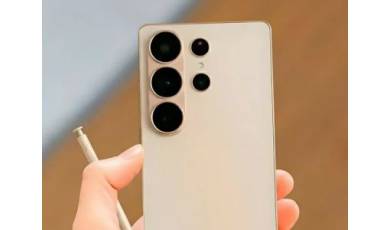Flash firmware on Condor Plume L8 Pro
Mobiles >> Condor >> Condor Plume L8 Pro| Specifications | Reviews | Secret codes |
| Unlock phone | Root phone |
| Backup | Flash Firmware | Screenshot |
How to flash Condor Plume L8 Pro?
Why reinstall the firmware?
Errors constantly appear in the Android operating system.
Some applications do not open, reinstalling which does not lead to a positive result.
Many applications from the Play Market do not start.
The phone turns off for no apparent reason.
The phone began to slow down a lot.
You are not satisfied with the functionality of the stock (official) firmware.
Where can I find the firmware?
On the website of your phone manufacturer.
On specialized services on which various developers lay out custom or official OS.
What should be done before installing the firmware?
Back up your contacts and user data and transfer it to your computer.
Insert your SD card into your phone. An SD card is needed to write firmware to it.
Determine your smartphone model.
Fully charge your device.
Download Firmware and Place it on the SD card.
Installing TWRP Recovery
Install the Official TWRP App via the Play Market. And run this application.
When you start the application for the first time, you need to give consent to future manipulations, as well as to give consent to granting the application Superuser rights and click the 'OK' button.
On the next screen, you need to select the 'TWRP FLASH' item and give the application root-rights.
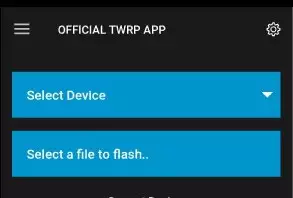
On the main screen of the application, click on the 'Select Device' drop-down list, and select your phone model.
After selecting a phone, the application will direct the user to a web page to download the modified recovery environment image file. Download the proposed *.img file.
When the file is loaded, you need to return to the main screen of the Official TWRP App and press the 'Select a file to flash' button. Select the file downloaded in the previous step.
Now press the 'FLASH TO RECOVERY' button and confirm your choice, press 'OK'.
When the message 'Flash Completed Succsessfuly!' appears. Click 'OK'. The TWRP installation procedure can be considered complete.
Transfer the firmware and other necessary files to the SD card.
Insert a memory card into the device.
To reboot into recovery, you need to use a special item in the Official TWRP App menu, accessible by pressing the button with three stripes in the upper left corner of the main screen of the application. Open the menu and select the 'Reboot' item, and then click on the 'REBOOT RECOVERY' button.
Firmware via TWRP
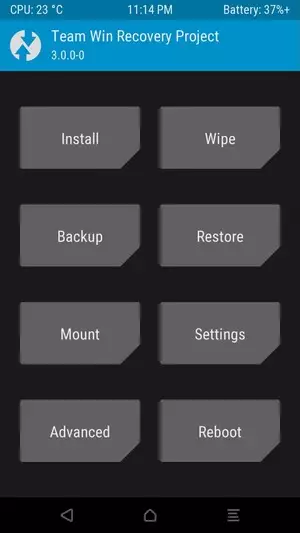
Before flashing, you need to delete all user data from the phone, this will avoid errors in the software, as well as other problems. Press 'WIPE' on the home screen.
Now you can start flashing. Press the 'Install' button.
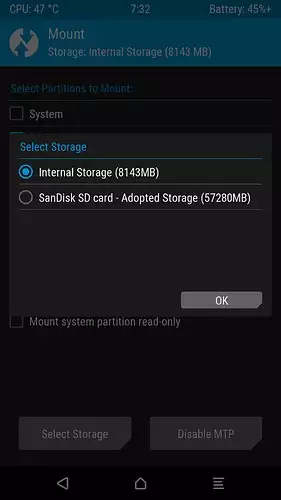
The file selection screen is displayed. At the very top is the 'Storage' button, which allows you to switch between types of memory.
Select the storage to which the files were copied. Press the OK button.
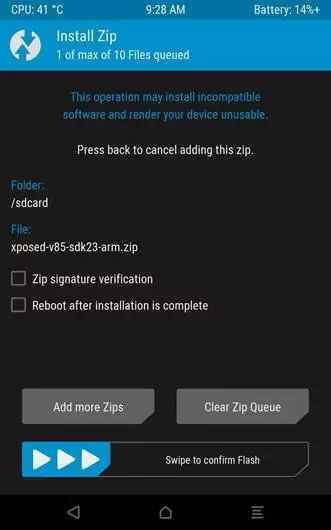
Select the firmware file and click on it. A screen opens with a warning about possible negative consequences, you need to check the item 'Zip signature verification', which will avoid using damaged files during recording.
The procedure for flashing the phone will begin, this is accompanied by the appearance of inscriptions in the log field and the movement of the progress bar.
After completing the installation procedure, a 'Successful' message appears on the screen.
Summary: Operating System: Android 9.0 (Pie); CPU: Octa-core (4x2.3 GHz Cortex-A53 & 4x1.8 GHz Cortex-A53); Chipset: Mediatek MT6765 Helio P35 (12nm); GPU: PowerVR GE8320; Size: 6.3 inches, 99.6 cm2 (~81.4% screen-to-body ratio); Display Type: IPS LCD capacitive touchscreen, 16M colors; Resolution: 720 x 1520 pixels (~268 ppi density); RAM ROM: 3 GB; Card Slot: Yes, up to 256 GB via microSD card (uses dedicated slot); Camera Sensor(s): 13 MP 8 MP 2 MP Main camera; Camera Type: Triple Lenses; Video Resolution: 1080@30fps, 720p@30fps,; Camera Sensor(s): 8-megapixel, f/2.2 aperture; Camera Type: Single Lens; Camera Features: FaceID, HDR, 6-level AI face Beauty Punch hole; Video Resolut ...
Comments, questions and answers on the flash firmware Condor Plume L8 Pro
Ask a question about Condor Plume L8 Pro

